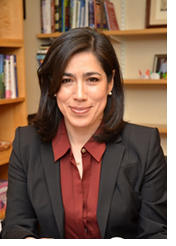Working with local communities to engage with global issues
This post is republished from Into Practice, a biweekly communication of Harvard’s Office of the Vice Provost for Advances in Learning
 María Luisa Parra-Velasco, Senior Preceptor in Romance Languages and Literatures, requires her advanced Spanish language learners in Spanish 59: Spanish and the Community to complete four hours a week of engaged scholarship with local organizations as part of their language learning experience. Through classroom discussions, travels from Cambridge to Chelsea (for example), meaningful interactions, and conversations in Spanish with members of the Latino community, they explore powerful concepts like “the borderlands” as related to global migration, changes in local demography, and in-between identities.
María Luisa Parra-Velasco, Senior Preceptor in Romance Languages and Literatures, requires her advanced Spanish language learners in Spanish 59: Spanish and the Community to complete four hours a week of engaged scholarship with local organizations as part of their language learning experience. Through classroom discussions, travels from Cambridge to Chelsea (for example), meaningful interactions, and conversations in Spanish with members of the Latino community, they explore powerful concepts like “the borderlands” as related to global migration, changes in local demography, and in-between identities.
The benefits: Engaged scholarship is not, as Parra-Velasco notes, “an add-on, but is integral” to her goal of having students develop the social awareness necessary for both linguistic and cultural fluency. Students experience being “in between,” which results in much deeper learning than a classroom discussion alone can provide. Many students report being transformed by the experience, acquiring critical cultural awareness, expanding their global horizons, and, for some, changing their career goals because of it.
The challenges: It takes an extraordinary time commitment to cultivate partnerships with organizations and coordinate positions for students: “There’s a high rate of staff turnover in local organizations. Usually when I call, a new person who is not familiar with the program answers, so I have to introduce myself and explain again the course and its dynamics.”
Takeaways and best practices:
- Draw up a contract. Students are provided with a form that both they and the local organization’s project coordinator must complete and sign to underscore the joint accountability of the relationship. The “contract” specifies the work the student will do, and how they will fulfill their hours.
- Facilitate reflective in-class discussions. Parra-Velasco ensures that, in every class, students relate their community engagement experiences to the topics discussed in class: “Students start making connections while I facilitate—I provide them with questions and opportunities to reflect. I also provide plenty of linguistic scaffold to raise their level of Spanish proficiency.” She evaluates changes in students’ language proficiency as well as their reflections on culture and commitment to what they’re learning in the community as part of their grade.
- Acknowledge who benefits most from the exchange. Although students can be of immediate help to partner organizations, Parra-Velasco believes that students benefit far more from the experience, as they have to interact in Spanish to develop deeper social and cultural understanding of the Latino community.
Bottom line: Engaged scholarship embedded in a course develops “linguistic and social understanding of the multicultural nature of today’s world. By connecting their lives at Harvard with local citizens and immigrants, students also recognize the historical roots of what they encounter. It’s not just about the ‘others.’ Student realize that the issues of the Latino community are tied up with their own futures.”

